“Things are happening at a scale which I could not imagine,” said Andriy Zelinskyy, S.J., during a short visit from the front lines of the war in Ukraine.
Father Zelinskyy made a 28-hour last-minute trip from Kyiv to the Bronx at the invitation of Fordham’s Army ROTC/Military Science Program and the Center on Religion and Culture after the campus Jesuit community helped make the connection. He was told by his commander last Tuesday that he had been granted a four-day leave.
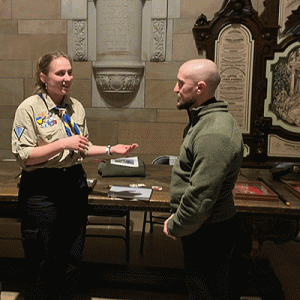
After spending part of the day with cadets from eight colleges and universities who participate in the ROTC program at Fordham, the chaplain spoke to a crowd of more than 200 in the Keating Hall auditorium on March 2. LTC Paul Tanghe, director of the ROTC program and professor of military science, led a one-on-one discussion with the chaplain followed by questions from the audience.
“The greatest surprise for me is that a human being in the 21st century can be so cruel,” he said. “There is no reason for all this violence.” While he believes there is good in everyone, Zelinskyy said acts committed by Russian troops are empirical evidence of the damage caused by a corrupt society where people are so “unfree.”
The atrocities he has witnessed he only alluded to, but he said it is clear to him that Russian soldiers have been so indoctrinated they don’t know how to be human. He cited as an example the bombing of a theater clearly marked as having children inside. “That pilot knew what he was doing. There was no danger. There was no one standing over his shoulder (making him drop the bomb).”
Father Zelinskyy said that while we think of the war as a year old, he has served as a combat chaplain for nine years—since Russia’s invasion of Crimea in 2014, serving unarmed alongside soldiers on the front lines. A chaplain for 17 years in all, he served most of that time as a volunteer while advocating for Parliament to structure a formal role for chaplains in the armed forces. It did so in 2021.
He calls the role of combat chaplain “humble, but a very rich and effective ministry.” He said, “Chaplains have to find a way to share feelings with the soldiers and find sense even in the suffering. Friendship is one of the best ways. For me personally, the greatest reward is when you feel that you can unite people and reinforce them.”
An audience member asked what the rest of us can do to help.
“Don’t give up on the truth. Don’t give up on justice, on what’s really good. Don’t stop contemplating the beauty of the human heart. Stay human. That’s our responsibility,” Father Zelinskyy concluded.
The “Chaplain in Combat” audience included a contingent of 20 U.S. Army chaplains as well as a New York Army National Guard chaplain. Members of the Jesuit community, Fordham Ukrainian Society students, and Fordham College at Rose Hill Dean Maura Mast also attended.
“Fordham is the flagship of the military-connected community in New York City,” said Tanghe. This event was part of a yearlong celebration of the University’s 175-year military legacy.
]]>Today, the program, which is jointly run by Fordham, the American Academy for Jewish Research, and the New York Public Library, continues to support these scholars, many of whom had to flee their homeland.
When the program was conceived, Fordham offered a year-long fellowship to a student pursuing master’s level studies in the area of Jewish and Slavic studies. The others, a mix of Ph.D. students and scholars working in the same area, were provided stipends, access to electronic resources at Fordham and the library, and invitations to five remote workshops.
Magda Teter, Fordham’s Shvider Chair in Judaic Studies and an administrator of the program, said the program will help scholars document this period in history. She said a source of inspiration for the project was the work of Samuel Kassow, who wrote about the efforts to document the experience of living in the Warsaw ghetto during the Holocaust in his 2007 book Who Will Write our History? (Indiana University Press, 2007).
“I think it is important for the moment to gather, to collect, to preserve, to remember,” she said.
“It is our duty to help these scholars in any way we can. Even small stipends mean a lot to them when their institutions have been bombed or are inaccessible.”
Working Even When the Lights Go Out
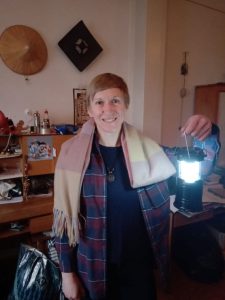
When Tetyana Batanova delivered the lecture “Yiddish Sources and Resources: My Personal Path to Jewish and Yiddish Studies” virtually from her apartment in Kyiv in the lecture series “Scholars at War” on April 8, it was a welcome splinter of normalcy. Russian armed forces, which had occupied her Kyiv suburb of Bucha in the opening month of the war, had only retreated from the area a week earlier.
Batanova, the acting head of the Judaica Department at the V. Vernadsky National Library of Ukraine, had been conducting research for her dissertation about the five Jewish political parties that participated in Ukraine’s national government in 1917-1918. At the time, Yiddish was one of four officially recognized languages in the country. Today only Ukrainian is officially recognized by the government.
With her country facing an existential crisis, Batanova said she had serious doubts about the importance of her research. The fellowship has helped restore her faith.
“Seven months later, I’m more confident in what we do, and that we should continue,” she said.
“But in April, it was not that obvious for me at all. When I was invited to give my lecture, it was good that it was in April, because in March I was not able to speak at all.”
Historical research is only as good as the original sources one can acquire, and having worked at the New York Public Library in 2006, Batanova knew what kinds of archival documents and journal articles she’d need. As a result of the fellowship program workshops, she was able to access new books from Fordham University Library online resources providing the context for her research, such as Stephen Velychenko’s book Life and Death in Revolutionary Ukraine : Living Conditions, Violence, and Demographic Catastrophe, 1917-1923 (Montreal: McGill-Queen’s University Press, 2021).
Her research focuses a great deal on Yiddish, a language intrinsically tied to the Holocaust and its victims. It was also the primary language of the 30,000 to 70,000 killed in anti-Jewish pogroms that swept Ukraine in 1919.
Although it is still spoken in pockets around the world, its importance is not widely known, making it an ideal path for the average citizen to learn about Ukrainian history, Batanova said.
“The story of Yiddish is quite similar to the story of Ukraine in the 19th century and the beginning of the 20th century.”
Fleeing War for NYC
Andrii Pykalo was just beginning his graduate studies when the war began. He attended V. N. Karazin Kharkiv National University, in Kharkiv, the country’s second-largest city just 25 miles from the Russian border. Feb. 24, the day that Russia attacked, will forever be cemented in his mind.
“I will never forget the sky over my neighborhood. It was yellow, because of all the Russian rockets,” he said.
“It was very, very noisy, and I remember the panic. It was a horrible surprise for all.”
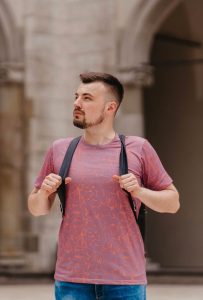
Continued study in Kharkiv was never an option; for starters, the university library was hit by a Russian missile. Pykalo said he tried to help save some of the books from the collapsed structure.
He had to jump through numerous bureaucratic hoops to leave, but he was granted permission in May, and he arrived in New York City to attend Fordham on Aug. 23. He has been living in an off-campus apartment in Harlem and attending classes, such as one on antisemitism with Teter and another one about advanced research methods by history professor Grace Chen, Ph.D.
For his research project, “Soviet Jews and the History and Memory of the Holocaust in Ukraine,” he’s been able to use his time in New York to locate documents that show how Americans viewed Jews in the Soviet Union at that time.
Apps such as Telegram and WhatsApp have made it possible for Pykalo to stay in touch with his friends and family, and he’s also connected with the Ukrainian diaspora in the East Village. But the decision to leave Ukraine was a fraught one.
“I understood that I should have been in Ukraine defending my country. I should be with my family, I should be with my friends,” he said.
“I was really afraid for my family, but they all told me that I must go because it’s my profession. This is my task.”
Seeking Safety in Michigan
Yurii Kaparulin, Ph.D., an associate professor of history and legal scholar at Kherson State University in southern Ukraine, found himself on the wrong side of the border when war broke out. While his wife and son were home in the city of Kherson, he was in Bucharest, Romania. His family spent a month in Kherson while it was occupied by Russian forces before they were able to evacuate and reunite. In August, they moved to Ann Arbor, Michigan, where Kaparulin received a separate, “scholars at risk” fellowship from the University of Michigan’s Weiser Center for Europe and Eurasia.
For Kaparulin, the Fordham fellowship, which he was offered after moving to Ann Arbor, has been invaluable for the completion of his book, “Between Soviet Modernization and the Holocaust: Jewish Agrarian Settlements in the Southern Ukraine (1924-1948),” which he began seven years ago.
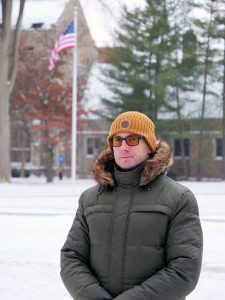
The war forced him to leave behind some of his own research, but more importantly, he lost access to his own university’s archives.
“Before Russian troops left Kherson, they looted the biggest part of the Kherson State archive. So I needed to figure out where I would look for sources and get some of the newest articles and books,” he said.
Through the Fordham fellowship, he’s been able to access resources such as the article Farming the red land: Jewish agricultural colonization and local Soviet power, 1924-1941 Jonathan L. Dekel-Chen, (Yale University Press, 2015), and “Men inspecting foals at an artel supported by the American Jewish Joint Distribution Committee, Kherson, Ukraine” a black and white photo from 1924.
His project addresses mass violence and wartime collaborators from the past–both of which have ties to the present. One of the reasons why Russian President Vladimir Putin has smeared Ukrainians as Nazis, he said, is because there were, in fact, Ukraine citizens who collaborated with the Nazi regime during World War II.
However, Russian propaganda effectively ignores the contribution of millions of Ukrainians to the victory over Nazism, he said. That is, when it comes to examples of collaborationism, the Ukrainian origin of the accused is emphasized, he said, and when it comes to heroism and victory, “Soviet heroes” are mentioned without ethnic context.
The phenomenon of collaborationism has also been observed during Russia’s current war against Ukraine. For example, during the occupation of Kherson from March to November 2022, some residents cooperated with the Russian occupiers.
“Their motives are currently being established by law enforcement agencies. However, in general, we see that the majority of the city’s residents have maintained the Ukrainian position despite various risks, including to their lives,” he said.
Providing Tools for Research
To help the scholars with their research, Shawn Hill, an instructional technologist in Fordham’s department of informational technology, delivered a workshop in November that walked participants through the reference tool Zotero. The bibliographic and citation tool makes it easier for scholars to organize papers, monographs, books, and articles.
He also demonstrated Art Steps, a tool used by interior designers, art historians, and gallery managers to create virtual exhibits.
“You may have a painting in Kyiv, a sculpture in Kharkiv, and something in Odesa. You can’t bring them together in the real world for obvious reasons, but you can create an Art Steps exhibition space and give the URL to a guest or a friend or the public as a whole.”
My Soul Is Still There
Lyudmila Sholokhova, Ph.D., Curator of the Dorot Jewish Collection at the New York Public Library, grew up in Kyiv, and like Batanova, she worked at the V. Vernadsky National Library before moving to the United States.
In 1997, she was the recipient of a fellowship and spent time at the United States Library of Congress. Now she’s the point person for the fellows in the program working with New York Public Library.
The fact that she’s able to now help other scholars from Ukraine moves her deeply. “My soul is still there. I want to help my people in any way possible. I want to support them,” she said.
“I know the value of access to all these enormous resources that these libraries can provide. When I was in Ukraine, I had access to the primary sources, but I didn’t have access to scholarship on the documents,” she said.
“When you work on this subject, you really need the context. You really need access to a much larger corpus of resources.”
]]>But there’s more to the war than just missiles and economic sanctions, said Elizabeth Prodromou, Ph.D, a non-resident senior fellow at the Atlantic Council’s Eurasia Center. To fully understand why Vladimir Putin plunged his country into war, Westerners would do well to look at his connections to the Russian Orthodox Church.
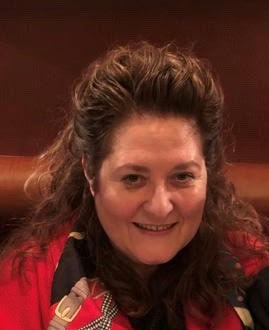
On Nov. 2 at 6 p.m., Prodromou will explore the issue in “Deconstructing Russia’s Ukraine War: Religion, Power, and the Geopolitics of Orthodox Christianity” at Fordham’s Lincoln Center campus. Her talk, the annual Economos Orthodoxy in America Lecture, is presented by Fordham’s Orthodox Christian Studies Center.
“What I want to do is peel away some of those layers and focus on the other features of the war, namely the importance of Ukraine as a space of contestation for Russia, vis-à-vis not only the hard security interests of the transatlantic alliance of NATO, but also the values that the alliance claims to represent,” said Prodromou, who is also faculty director of the Initiative on Religion, Law, and Diplomacy at Tufts University.
“Russia sees Ukraine not only in terms of its territorial importance and its existential security interests but also as a critical religious and cultural space for the protection of and projection of its own values and influence.”
To understand why culture plays as large a role as territory in the war, Prodromou said one need only observe the closeness between Putin and Patriarch Kirill of Moscow, Primate of the Russian Orthodox Church. Unlike the majority of Orthodox Church leaders around the world, Patriarch Kirill has pointedly not criticized the invasion.
“Not only has he refused not to condemn the war, but he has also been supportive of Vladimir Putin’s articulation for the rationale for the war. As a consequence, Patriarch Kirill has been subjected to withering criticism from other Orthodox Churches worldwide, including Bartholomew, the Ecumenical Patriarch of Constantinople,” she said.
“That has produced enormous tension and contestation within the Russian Orthodox church, as well. Not a lot of it is very public, but by virtue of reportage from priests, lay people, and experts in that church, it’s clear there is a grave disagreement within the Moscow Patriarchate about the support for the invasion.”
In her talk, Prodromou said she will explore the relationship the Russian Orthodox church and the Russian government have had going back decades. Although the church was violently suppressed during the Cold War, it initially flourished after the Soviet Union collapsed, having found a supportive partner in the government that followed. Patriarch Kirill’s support of the Ukraine invasion has clouded the picture of the partnership, in ways that Prodromou said echo how bishops in the Roman Catholic Church once allied themselves with autocratic leaders in Central and South America.
“That church/state closeness, in the form of the alliance between Putin and the patriarch, has led to a cynicism among many Russian Orthodox believers,” she said.
“Some speculate whether this is a church-state relationship that has been cemented, or whether it is just a partnership between Putin and Kirill. In a post-Putin and post-Kirill world, what will the relationship between the church and the state look like? That’s hard to predict.”
If there is a positive development to the current situation, it’s that Patriarch Kirill’s endorsement of the war has also thrust Orthodox Christianity in general into a brighter spotlight.
“That has led to a greater inquiry into Orthodox Christianity by scholars, policymakers, and media experts. That’s led to a far more nuanced understanding of the global footprint and the incredible pluralism within Orthodox Christianity” said Prodromou.
“It has moved aside the conventional, essentializing stereotype that all Orthodox Christianity is the same, regardless of local conditions.”
It’s also a good display of the value of “soft power.” In exchange for giving his blessing to the war, she said, Patriarch Kirill has found in Putin an enthusiastic proponent of the social conservatism that he favors.
“There are all these kinds of power in the power toolbox—hard, soft, sharp, smart, and I’ll be exploring these in my lecture,” she said.
“Especially in the 21st century, there’s a whole host of tools of power that can be deployed for influence building and projection of influence, whether by force or other means.”
George Demacopoulos, Ph.D., the co-founding director of the Orthodox Christian Studies Center, said he expects Prodromou’s talk will be enlightening for anyone who cherishes the value of free religious expression that has not been co-opted by politics.
“For years, Dr. Prodromou has been a champion of the twin causes of religious freedom and human rights, particularly in the Middle East,” he said.
“Few have her comprehensive understanding of the lived experience of religious minorities in fraught political situations.”
]]>For Priya Ravindran, who met her Ukrainian husband at Fordham and later adopted his country as her own, reporting on the war and sharing her young family’s story is an act of resistance.
When Russian president Vladimir Putin ordered a full-scale invasion of Ukraine in February, Priya Ravindran was living in Kyiv with her Ukrainian husband and their 2-year-old son, Neil. The couple met in 2010 as graduate students at Fordham and were married in Kyiv four years later.
“We led fairly normal lives. We worked, traveled within Ukraine and internationally, went out on the weekends, went out to eat, met with friends,” said Ravindran, who was an editor at the Ukrainian state-run news station UATV English before going on maternity leave in 2019. “It wasn’t until February 24 that our lives changed forever.”
Two days later, amid reports of military and civilian casualties near Kyiv, they fled, joining more than 12 million people who would leave their homes following the Russian invasion.
‘Trying to Play My Part’
As they drove away, “Alex asked me in the car, ‘Do you realize you are now officially a mother fleeing war with an almost-3-year-old?’” Ravindran wrote on February 26.
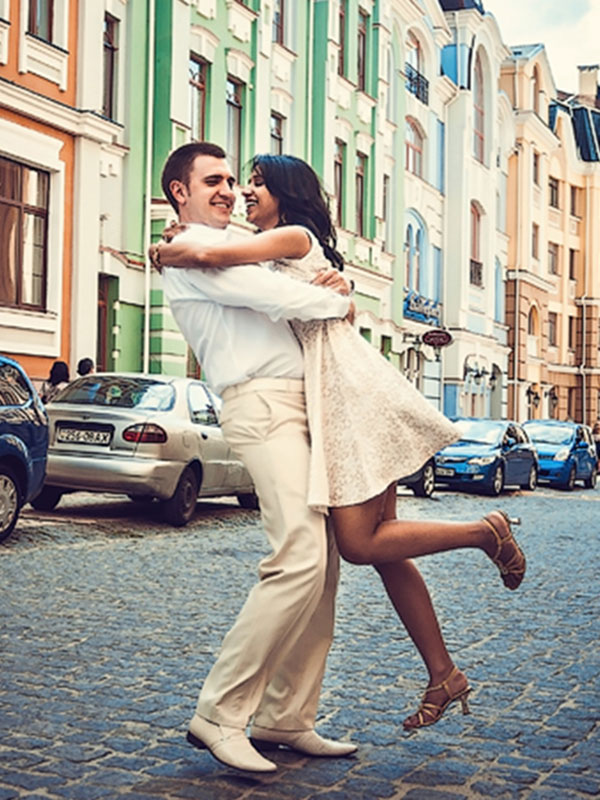
“We always knew this was a possibility. Even before I got pregnant, I asked Alex many times, ‘What if we have a child and full-out war breaks out?’ … Like with everything in life, you try to put those thoughts at the back of your mind, but here we are.”
They headed west with a friend and his mom, driving through numerous Ukrainian military checkpoints. “We are surrounded by the Carpathian Mountains, vast snow-covered fields, and heaps and heaps of trees with just the perfect amount of snow,” she wrote. “Seeing the pristine beauty of nature, I almost think to myself, ‘This is all a dream, right? It has to be.’ But no, this isn’t a dream. … Ukraine is still fighting for its existence.”
On February 28, they arrived at their destination: a friend’s home in Ivano-Frankivsk.
“I have a lot of guilt that I’m not doing enough, not helping enough,” Ravindran wrote that day. “But I’m trying to play my part in letting people know what’s happening, as best as I can, in the best way I know how: through my love of writing.”
Since late February, Ravindran has been posting daily accounts of the war. In each post on her public Facebook page, she typically mixes news and analysis with a firsthand account by another writer as well as personal stories of her family’s experiences and emotions. (To protect her husband’s identity, she uses the pseudonym Alex to refer to him.)
Her posts have reached a broad audience. On March 3, one day before Neil’s third birthday, she was interviewed by Indian TV journalist Barkha Dutt, “whose reporting in the 1990s on the India-Pakistan war convinced me as a 12-year-old to be a journalist,” Ravindran wrote.
From Mumbai to Kyiv via Rose Hill
Born in Mumbai, Ravindran was 17 years old when she moved from India to the U.S. to attend college. After earning a bachelor’s degree in journalism and international relations at the State University of New York at Oswego, she enrolled at Fordham to pursue a master’s degree in political science.
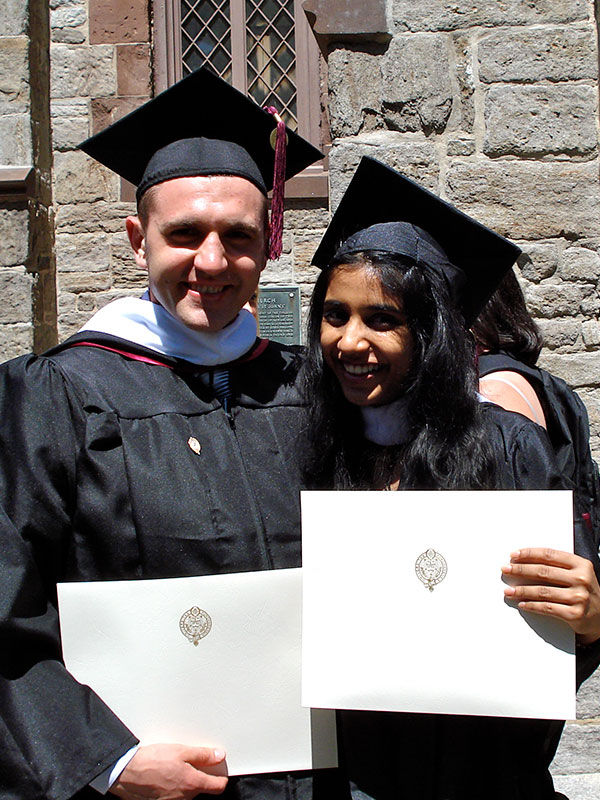
The day before her classes started in fall 2010, she left her walk-up apartment on Arthur Avenue to buy groceries. “When I returned, I was holding the door to the building open with one leg while pushing all my bags in,” she said. “At the same time, Alex exited his apartment on the first floor, stopped, and asked me if I needed help. I told him I could manage, but he insisted, so he carried all my bags upstairs and started to run away. I screamed ‘Priya!’ after him, and he said, ‘Alex!’”
Alex had arrived at Fordham on a Fulbright Fellowship, and he was enrolled in Fordham’s International Political Economy and Development program. The two saw each other in class the next day, Ravindran said, but it wasn’t until the end of the semester that she learned that they share a love of trance music. “I invited him and his roommates to a concert by a famous German duo,” she said. “He asked me out the next day, and the rest is history, as they say.” They were married in Kyiv on June 26, 2014.
A Rousing Song for the Motherland
In her daily posts on Facebook, Ravindran has covered numerous aspects of the war. In early July, she published transcripts of phone conversations intercepted by the Ukrainian Security Service in which Russian soldiers discuss the killing of civilians. In mid-May, she shared the results of a Kyiv School of Economics study indicating that, as of May 10, the war had caused an estimated $600 billion in economic losses in the country. And in June, she covered a nightly address by Ukrainian president Volodymyr Zelenskyy in which he said that at least 828 children had been affected by the war—446 injured, 243 killed, and 139 missing.
“We talk about war and its impact in numbers, and as jarring as they may be,” Ravindran wrote, “they don’t always convey the full story. … They don’t tell us about the trauma parents and their children are dealing with. We remember so many wars in numbers, but we forget about the stories.”
Amid the fear and anxiety of the war, and the near-constant threat of air raids, she has found moments to celebrate: the “happiness on Neil’s face” when he gets a couple of “siren-free” hours to play in a local park, for example, and the “immense joy” of seeing the Ukrainian rap and folk band Kalush Orchestra win the annual Eurovision Song Contest in mid-May.
“It doesn’t mean anything for the war,” she wrote at the time, “but it was a small relief for the psyche.” She noted that the band’s lead singer, Oleh Psiuk, wrote the winning song, “Stefania,” as an ode to his own mother. But since the Russian invasion, the song has taken on new meaning.
“People have been using the song to symbolize Ukraine—the yearning of children who have been separated from their mothers because they are serving in the military; the emotions of sons who are missing their mothers who crossed the border to bring their other siblings to safety; the pain of children who have lost their mothers to the war,” Ravindran wrote.
And with lyrics like, “I’ll always find my way home, even if all roads are destroyed,” she added: “Some are reminded of the motherland itself.”
Read Priya Ravindran’s Ukraine war journal on Facebook at @pravindran1.
]]>“I came immediately when the war started and ended up right in the middle of mayhem in eastern Ukraine very quickly,” he said.
In recent months, his pictures have been published in The Wall Street Journal, The Atlantic, and other publications. He was among the first to document the mass killings of unarmed civilians in Bucha. In April, he photographed the country’s embattled leader, Volodymyr Zelenskyy, at the presidential compound in the capital, Kyiv. And in June, he spent time with soldiers near the front line in the Donbas. One of his pictures—of a young woman rescuing dogs from a shelter in Irpin amid Russian attack in the early days of the war—has taken on a life of its own as a symbol of Ukrainian resistance.
It’s the kind of work that Occhicone has wanted to do since he was an undergraduate at Fordham in the early 1990s, when a friend and fellow classmate of Croatian descent showed him magazine stories depicting war in the former Yugoslavia. “I remember the pictures, I remember who took them, and it became a kind of goal of mine” to become a war photographer, Occhicone said by phone from Kyiv in early March.
Another inspiration, he said, was his grandfather, a World War II veteran who lived in the Belmont neighborhood of the Bronx, near Fordham’s Rose Hill campus. “The family dream was always to go to Fordham,” Occhicone said. “That was like success, you know? He came from Italy, and seeing the Fordham guys, [he thought], one day, somebody in our family will go there.” Occhicone’s grandfather died in 2017 at 101.
“He talked about [his war experiences] until maybe his last day, and it was always about the comradeship and the bonding,” Occhicone said. “That’s something I wanted to understand.”
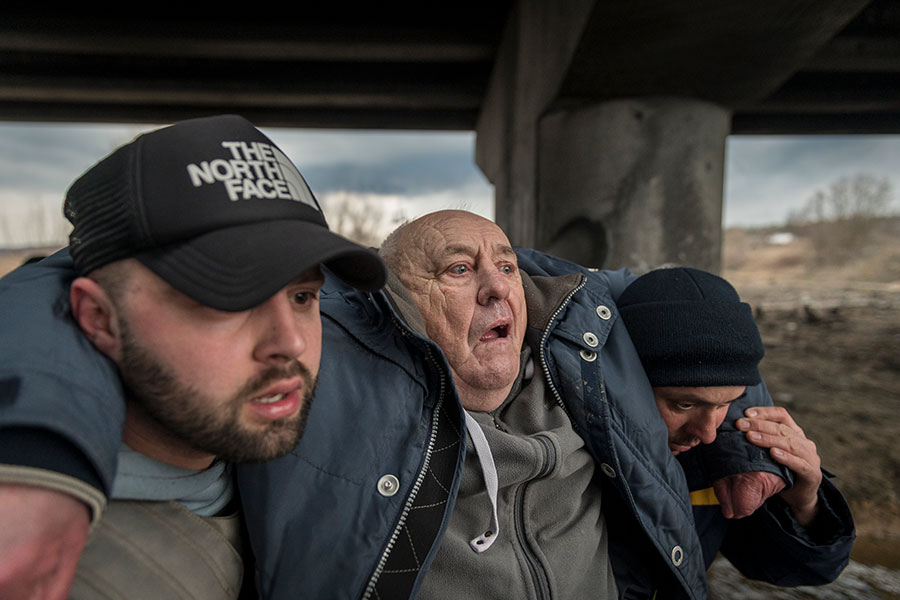
Evacuating Civilians Amid the Battle of Irpin
On Saturday, March 5, as Russian forces surrounded Kyiv on all sides but the south, Occhicone joined a convoy of volunteers who arranged to help evacuate several dozen people hiding in a church basement in Irpin, a city about a dozen miles northwest of Kyiv. To help slow the Russian advance, Ukrainian forces had blown up a bridge over the Irpin River, one of the main routes leading out of the city toward Kyiv.
“We were deep in the city [bringing people out], and in the middle of it, we started getting shelled—small arms fire flying overhead, tanks shooting buildings maybe 200 meters away,” Occhicone said the next day. “We were able to get out, but right in front of us, maybe like a couple of hundred feet, guys blew up a Russian vehicle, a road was closed. It was just chaotic. You don’t know who’s where.”
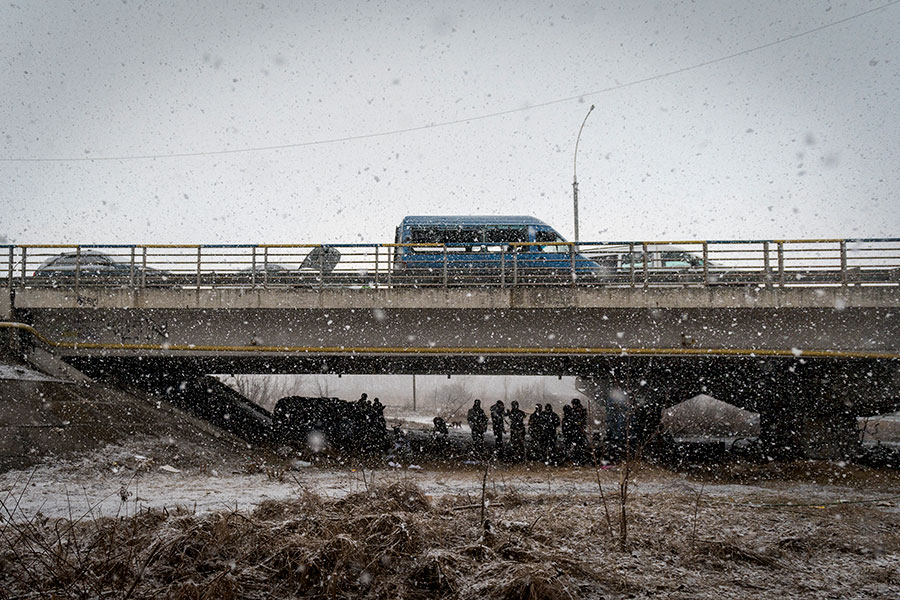
Occhicone returned to the city to photograph and assist with successive waves of evacuations near the battered bridge.
“I don’t know who said war is hell, but it is hell, and you’ve got to document it,” he said on March 17, describing the fear experienced by civilians leaving homes burned to the ground, carrying a “plastic bag with some shoes” in it.
By the end of March, Irpin was “an abandoned ghost town of ruined buildings,” Reuters reported, but Ukrainian forces had recaptured the city and helped prevent a siege of Kyiv.
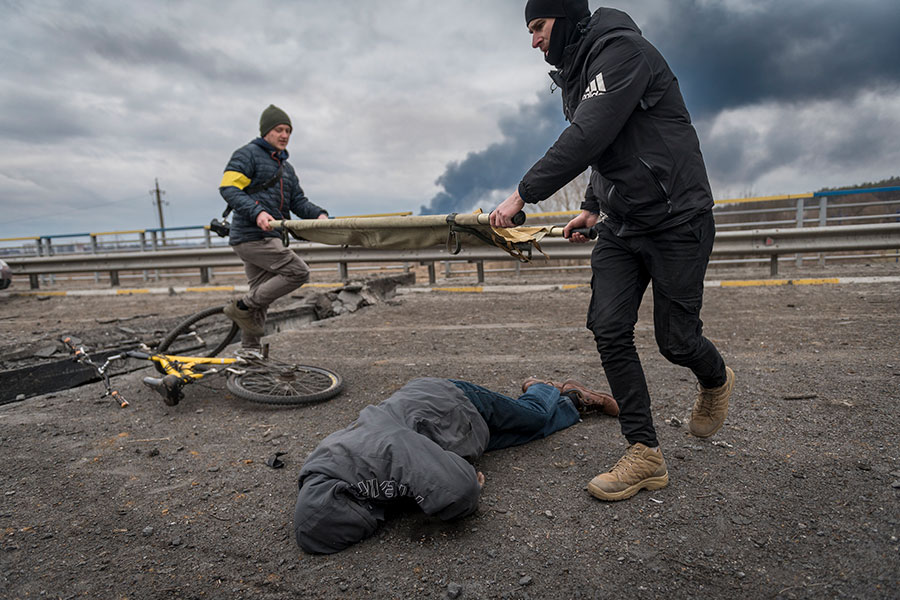
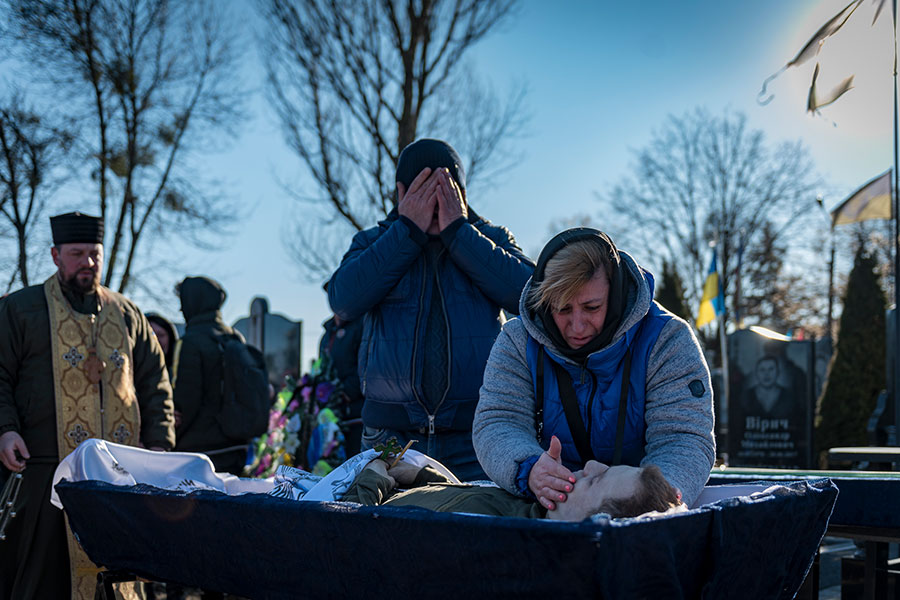
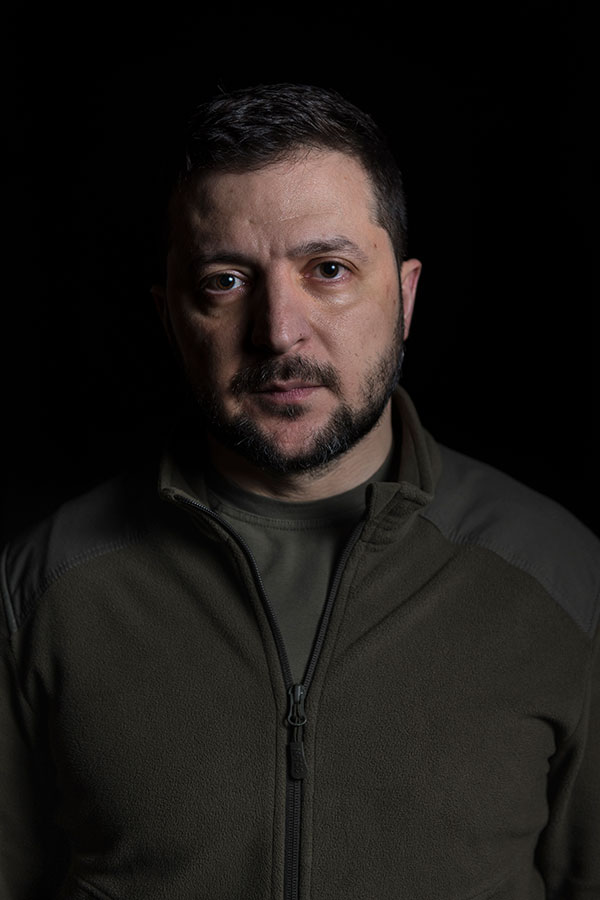
President Volodymyr Zelenskyy for The Atlantic. He
accompanied the magazine’s editor in chief, Jeffrey
Goldberg, and Anne Applebaum, who interviewed
Zelenskyy at his compound in Kyiv: “Ukraine can win—
and by ‘win,’ he means continue to exist as a sovereign,
if permanently besieged, state—only if its allies in
Washington and across Europe move with alacrity to
sufficiently arm the country,” they wrote.
In Bucha, Helping a Son Find and Bury His Father
In early April, Occhicone was one of the first photojournalists to arrive in Bucha, about 20 miles northwest of Kyiv, after it was liberated. “When we entered the city, we saw [people] putting the Ukrainian flag up at the city hall,” he said. He also saw and documented graphic evidence of war crimes.
Retreating Russian soldiers had left behind dozens of dead civilians, some with their hands tied—atrocities that prompted U.S. President Joe Biden to describe Russia’s war in Ukraine as genocide. In an auto repair shop in an industrial part of town, Occhicone photographed the body of a man in work clothes with a gunshot wound to his head. He apparently had been executed and left in a well in the garage.
“At the time, I didn’t know who he was. I just assumed he was a mechanic,” Occhicone said, “and my father’s an auto mechanic by trade—he owned a gas station, real estate, and other stuff, but that’s how he started out. So I see this older man executed in what I thought was his place of business, and that’s probably the one that affected me the most.”
About two weeks later, a Bucha city councilwoman contacted Occhicone. She had been collecting pictures of the atrocities from journalists and others in an effort to help residents locate missing family members, she said, and a young man had seen the picture of the man in the garage and recognized the body as his father’s. She asked if Occhicone would like to meet the family at the morgue in Kyiv in the morning.
Although he was in Romania, taking his first brief vacation in many months, he made the 12-hour drive to meet the family. At the morgue, he learned that the man, Myron Zvarychuk, was not a mechanic but a Ukrainian Orthodox priest. He had been associated with St. Michael’s Golden-Domed Monastery in Kyiv, and he was working at a small church in Bucha, where he had been renting a room from an older woman named Kateryna. On the day he disappeared, he had left to get food and water for her.
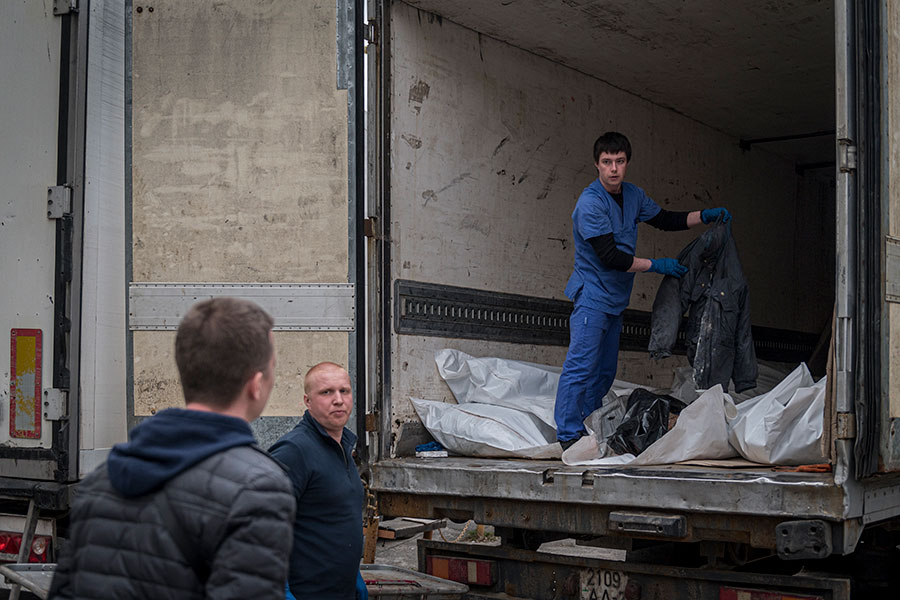
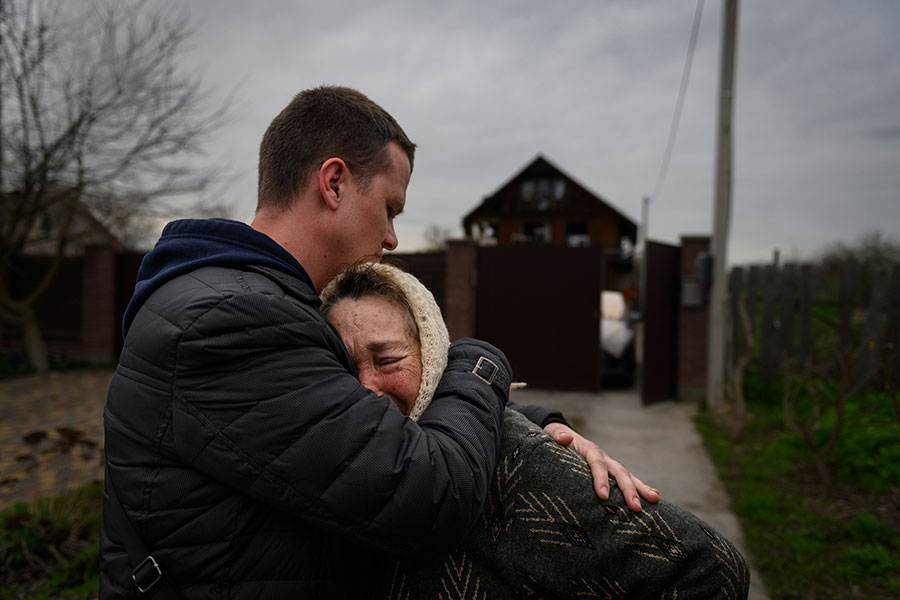
From the morgue, Occhicone accompanied the family to Father Zvarychuk’s room in Bucha, where they picked up the priest’s vestments. After returning to Kyiv to collect the body, they traveled to his native village, near Ivano-Frankivsk in western Ukraine, and Occhicone spent several hours at the family’s home before attending the funeral Mass and burial.
“To be able to meet the family and spend a day with them was really an incredible experience,” Occhicone said. “You normally don’t get to follow up on these things. You’re in a situation where there’s dead bodies all over the place, and it feels very surreal. But to be able to put a name to the man, to know something about him, to meet his family was really a great thing, you know. This guy was a loved person. People loved the village priest.”
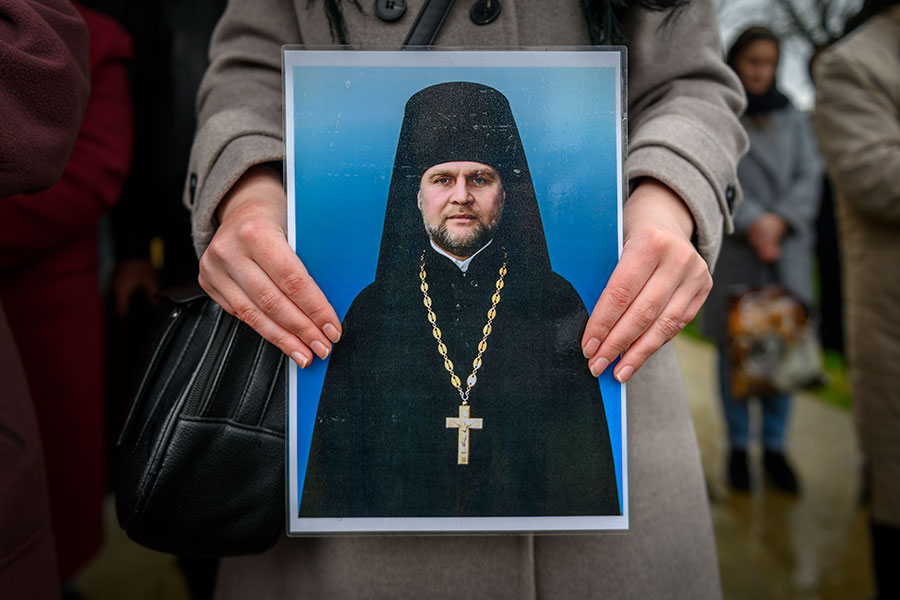
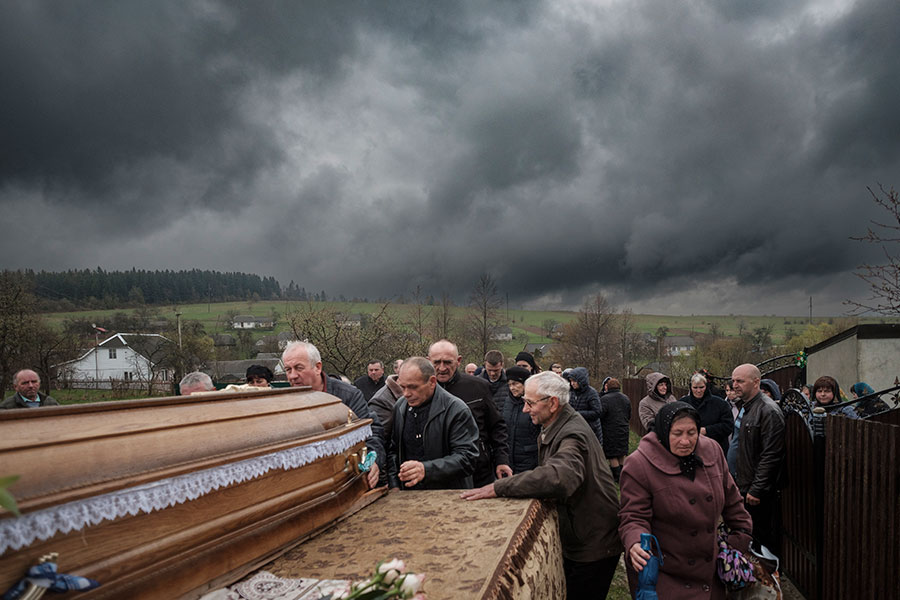
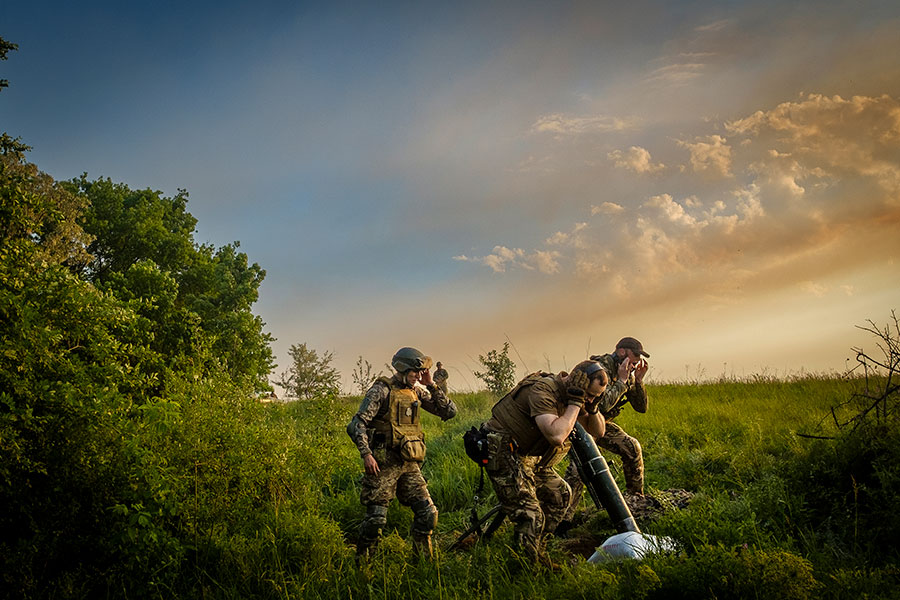
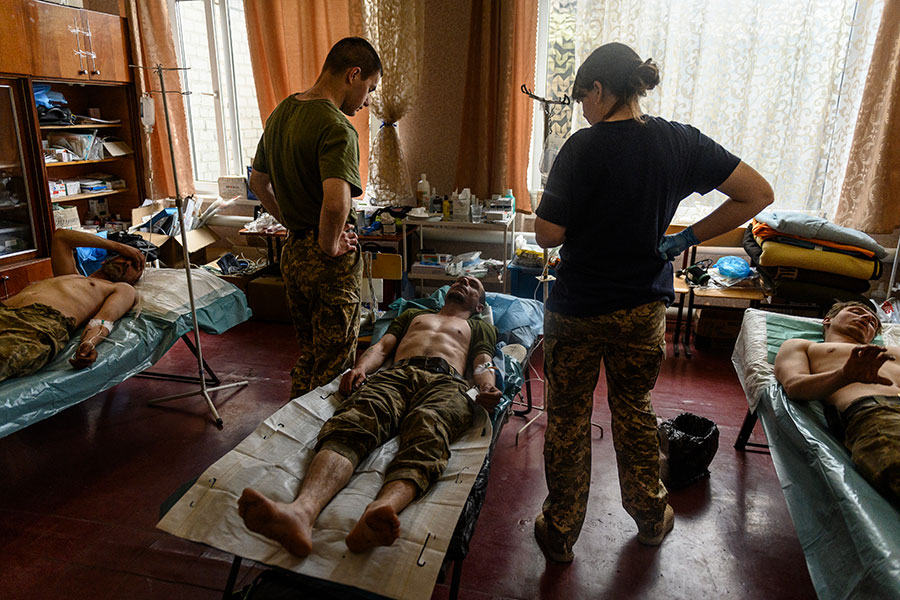
Capturing the Spirit of the Resistance
On March 10, while returning to Irpin to document the humanitarian evacuation of the city that was later retaken by Ukrainian forces, Occhicone made what has become his most iconic and widely seen picture of the war.
“In this atmosphere of fear,” he wrote on Instagram that day, “a woman emerges and she is bringing disabled dogs from a shelter to safety.”
He went to sleep after posting the picture, and “the next day, people were like, ‘The president just reposted you.’” He said the image was featured on the country’s official website, and it brought attention to the young woman, Anastasiya Tikha, a veterinary student who runs an animal shelter in Iprin. He allowed the image to be used by a dog food company that sought to raise money for people in Ukraine, he said, and with Tikha’s permission, he provided her bank account information to dozens of people who wanted to send her donations.
“People are making posters and memes of the image,” he said, “and sending me drawings of the photo from all around the world.” For many people, the image has come to symbolize “the cruelty of the Russian war and the dignity of the Ukrainian response,” The Guardian wrote in a May 23 article about Tikha.
“She’s a woman of action, and people love that,” Occhicone said. “And it’s dangerous. This is exactly where [U.S. journalist and filmmaker] Brent Renaud was killed [on March 13], and this girl took all the dogs out of the kennel and just walked them out of town.”
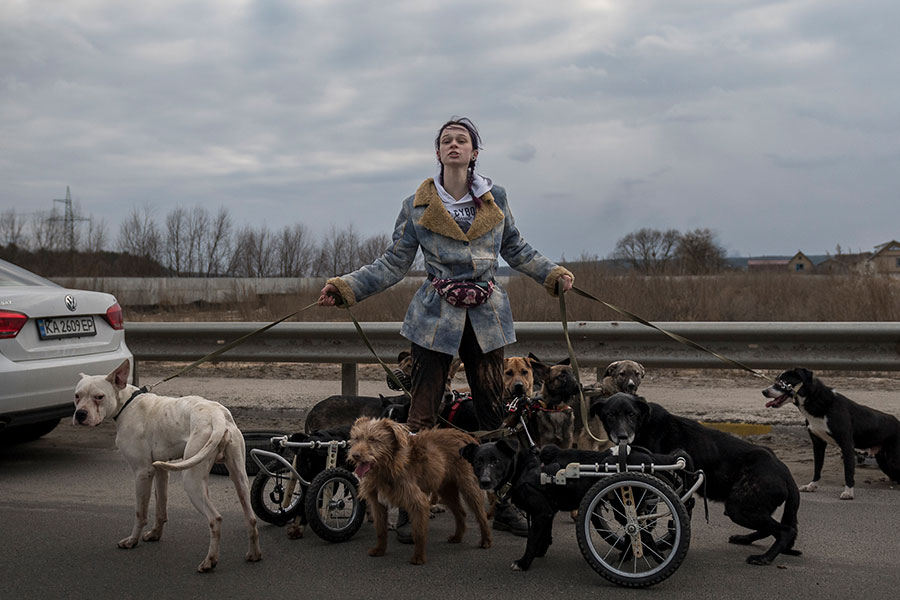
About Christopher Occhicone
After earning a bachelor’s degree in history from Fordham in 1995, Occhicone worked as a teacher in Poland and Italy, and pursued graduate studies in public health at Harvard University and conflict resolution at Seton Hall University. In 2014, he completed the one-year program in documentary practice and visual journalism at the International Center of Photography in New York City.
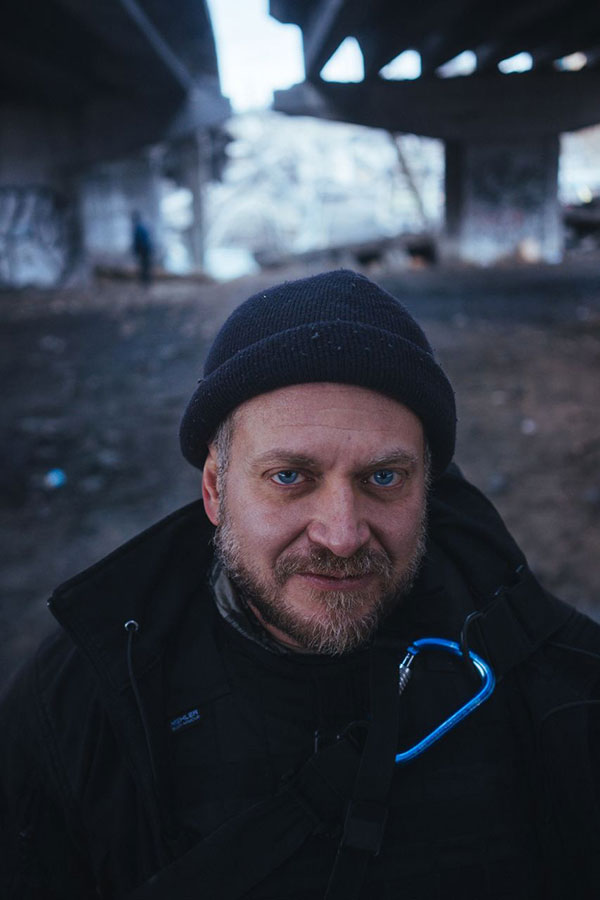
Kim Bepler, a Fordham trustee fellow, is providing a dollar-for-dollar match for all donations to the new Fordham Ukraine Crisis Student Support Fund, up to $50,000. The fund will be used for essential needs such as meals, housing, emergency health care, travel funding, tuition assistance, and more.
It is meant to help roughly a dozen Fordham students from the two countries whose finances, and lives, may have been disrupted because of the conflict. A few of those students have already sought help from the University, and more are expected to do so.
Bepler said she offered the funding as a way to help Fordham students who have lost not only their funding sources but also their sense of certainty and stability.
“I feel strongly about the situation, especially [because of]the students and how vulnerable they must feel when they have no access to their family and they don’t know what’s going to happen to them next,” she said. “It’s not fair.”
The war has caused anguish and a sense of helplessness for some Fordham students who have family members in Ukraine who are caught up in the conflict. It has prompted rallies and discussions in the University community, as well as a fellowship program cosponsored by Fordham’s Center for Jewish Studies to help Ukrainian scholars carry on with their work, despite the conflict.
The Russian invasion has caused $565 billion in economic losses in Ukraine, one of its government ministers said on March 28, and more than 4 million refugees have fled Ukraine since the start of the invasion, according to the United Nations High Commissioner for Refugees.
Russian students are vulnerable too, as financial freezes in response to the Russian invasion can keep Russian families from supporting their students in the U.S. These young people may also be impacted emotionally by the backlash that Russians around the world are facing due to Putin’s actions. Bepler expressed hope that Russian students would not feel burdened or isolated by an action begun by the Russian president.
“This is symbolic of defending democracy against a madman,” she said. “In response to the madman, we’re going with magis,” she said, referring to the Jesuit concept of always seeking more opportunities to help others.
“If my small gesture helps one student do one simple thing much easier, and with less pain,” she said, “I feel very blessed.”
Donate to the Fordham Ukraine Crisis Student Support Fund.
To apply for assistance from this fund, please contact Brian Ghanoo, assistant vice president, Office of Student Financial Services, at 718-817-3811 or [email protected].
]]>At boisterous local rallies and during intellectual discussions of the war, they’ve been inspired by expressions of support for the Ukrainian people, they said, but in quieter moments, they can be overcome by grief.
“There has been so much guilt and helplessness—it’s hard to do anything,” said Julia Kadar, a first-year Fordham College at Lincoln Center student. “I feel like, how dare I study for midterms and do homework and worry about my grades and worry about my future when there are people, children, whose futures have been taken away from them.”
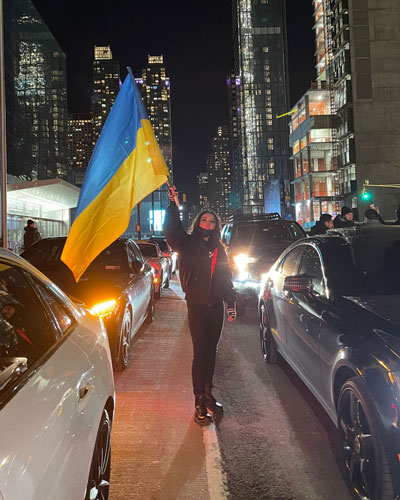
Keeping Up from Abroad
Kadar’s Ukrainian-born parents live in the United States, but her grandparents, aunts, uncles, and cousins still live in Ukraine, near the country’s border with Romania. Some of her cousins are fighting in the war, while other family members have taken in people who fled the eastern part of the country in recent weeks.
“Everyone’s scared. No one thought that this would happen,” she said. “I remember speaking to my grandpa three days before the war happened, and I asked him, ‘Oh, there’s rising tensions between Russia and Ukraine, has anything affected you guys yet?’ He was saying, ‘No, no, everything’s fine,’ and so no one thought that three days later, cities would be bombed.”
Dr. Areta Bojko, who graduated from Fordham College at Rose Hill in 2014, is currently an obstetrics and gynecology resident at Tufts Medical Center in Boston. She said that in the past month, she has struggled balancing her life in the United States with a sense of responsibility to her family in Ukraine.
“We’re not there in Ukraine—we’re here in America, living our lives, and when these things happen, it tears you apart in a way because you want to be there and you want to physically be on the ground supporting, but you still have to go to work every day and show up,” she said.
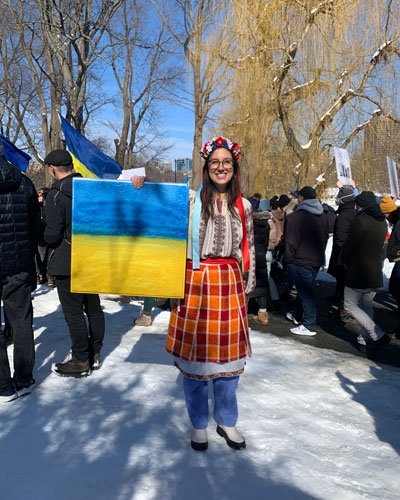
For Bojko and her family, reports of Ukrainian refugees in Europe evoke a kind of déjà vu.
“My parents would have been born in Ukraine had it not been for a very similar situation during World War II, when their parents had to flee Ukraine,” she said. “They were born in Poland and in Germany, so if you can imagine moms that are fleeing now, that are pregnant from Ukraine, delivering in these countries that they’re fleeing to—that’s exactly what happened to my parents.”
For Fordham men’s basketball player Rostyslav Novitskyi, who was born in Kyiv, the Russian invasion coincided with the lead-up to the team’s participation in the Atlantic 10 tournament.
“It’s painful. It’s very hard,” he told the New York Post after scoring a career-high 10 points in Fordham’s Feb. 28 victory against the University of Massachusetts. “I’m stressed. It’s really hard to see what’s going on with my country.”
Putting the War in Historical Context
Olena Nikolayenko, Ph.D., a professor of political science at Fordham, emphasized the history of Ukraine’s occupation—not only during World War II, when it was invaded by Nazi Germany, but also since 2014, when Russia seized the Crimean Peninsula from Ukraine and occupied eastern parts of the country.
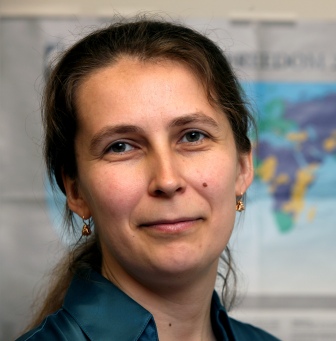
“The war hasn’t just started last month—it’s been going on for the past eight years,” said Nikolayenko, who grew up in Ukraine and has published two books on youth in Eastern Europe, with a particular focus on the role of nonviolent youth movements in advancing democratization.
The international community has refused to recognize the Russian annexation of Crimea, but for years it has viewed the fighting in the Donbas region of eastern Ukraine as a “low-intensity” conflict, Nikolayenko said, and, until recently, continued to do business with Russia as usual. Many European countries still spend millions of dollars to purchase Russian oil and gas, which is used to help finance the war.
“So it was painful to watch for the past eight years, but of course, in recent weeks, with an escalation in violence and the full-scale invasion of Ukraine, the bombardment of residential areas, hundreds and thousands of deaths of civilians, including children—it’s just heartbreaking to watch from afar how the country is under attack,” Nikolayenko said.
Bojko said that the trauma in Ukraine is more intense and widespread now, but it has evoked the same mixture of emotions she felt in spring 2014, when she was a senior at Fordham and the war began.
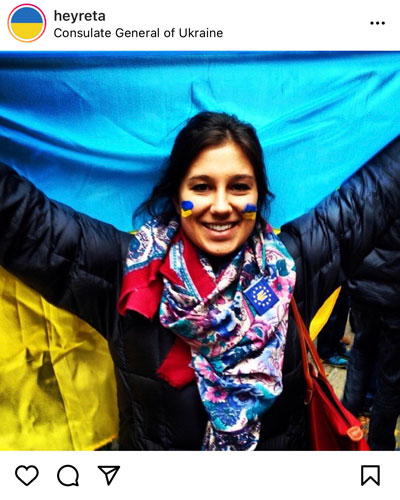
“I was looking back at my photos, and I am seeing my Instagram posts from 2014 with a flag—holding up a flag and I’m at a protest, and here it’s happening again,” she said. “I don’t know, it feels helpless, I guess you could say.”
Finding Community, Extending Support to Ukraine
Since the invasion, Bojko has connected with fellow members of the Ukrainian Medical Association of North America, and they’ve been working to gather donations and medical supplies for hospitals in Ukraine.
Kadar said that despite feeling helpless, she’s helped organize prayer vigils and rallies while supporting other efforts in New York City and on campus, including a monthlong donation drive led by Fordham’s chapter of Student Veterans of America to aid those in Ukraine.
“The day the war started, I organized a rally for the next day, and students from Fordham Lincoln Center marched to Times Square—I did not expect so many people to show up,” she said. “It was amazing to see that people actually cared.”
The Fordham men’s basketball team has stood in solidarity with Novitskyi. Players wore the Ukrainian flag on their jerseys for the final few games of the season, and before a home game against the University of Massachusetts in February, they participated in a moment of silence for Ukraine.
“I’m very glad my team and my school supports me,” Novitskyi told the New York Post. “I feel their support and I’m very appreciative of that. … It really feels like they love me and they are trying to help me and make me feel better. It feels like we’re a family.”
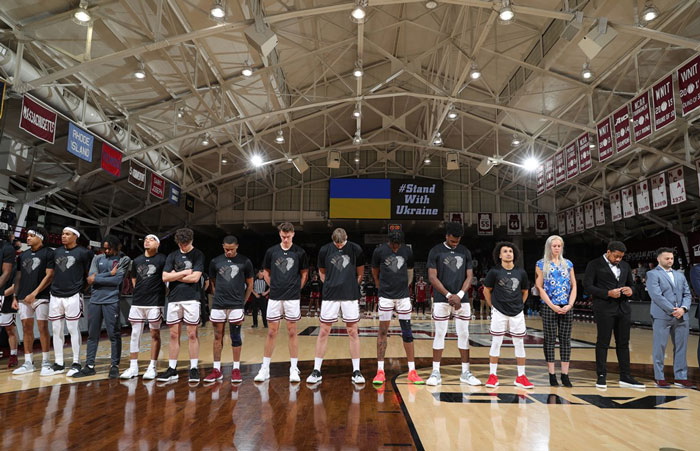
Nikolayenko said that she’s working with other university professors to provide resources, such as scholarship and fellowship opportunities, to students and academics fleeing Ukraine. She’s also using her platform as a scholar and public intellectual to share her expertise and help people understand the war and its impact. On March 11, for example, she co-organized and chaired a roundtable called “Women and Russia’s War on Ukraine.”
“In every war, usually men are seen on the front lines, but I wanted to highlight the role of women in the war,” both in the military and as activists, she said. “There are a lot of women who chose not to flee and who stayed, and they try to be helpful in any way they can. I’m a university professor—I’m not a military expert, and I can’t fight on the battle ground. But I think many Ukrainian Americans try to work on different fronts, wherever they can put their skills to the best use.”
Keeping the Focus on Ukraine and What Comes Next
One of the best ways to put those skills to use is to keep the conversation on Ukraine at the forefront, especially as the war drags on, Nikolayenko said.
“People can get tired of all the horrific scenes that they see from Ukraine, and they might lose interest in the war crimes that the Russian military commits,” she said. “That’s why it’s important for university professors, journalists, and public intellectuals to speak up and keep Ukraine on the public agenda.”
Kadar said she’s trying to do that through her social media platforms. “I almost feel bad for having to ruin people’s stream of scrolling, but there’s a war going on,” she said, and she wants people to be “mindful” of its impact on the Ukrainian people and to appreciate things that can be taken for granted such as family, shelter, and food.
Bojko said she’s been encouraged by the outpouring of support for Ukraine among people in the U.S. and throughout the world.
“My one worry is that people are going to forget about this issue in a week or two, and I just really hope that we can keep the momentum going with helping Ukraine and not be desensitized to what we see in the news,” she said. “I would really urge people to not forget, and not turn away—really lean into it and try to learn about it.”
Nikolayenko said that even those without close connections to Ukraine should continue to pay attention because she believes the future of democracy is at stake.
“This war is not just about Ukraine’s national independence and its fight for survival,” she said. It’s “indicative of a global trend where we observe a resurgence of authoritarianism across the globe.”
]]>“I don’t want to leave Kyiv. I was born here. I love Kyiv. Kyiv is the most beautiful city in the world,” said Vitaly Chernoivanenko, Ph.D., a Ukrainian scholar who spoke at a Fordham virtual panel on March 17. “I’m not afraid of Putin and his military forces.”
The panel is part of a new Fordham initiative designed to help Ukrainians during the Russia-Ukraine war. Fordham’s Center for Jewish Studies is co-hosting a virtual lecture series that discusses how the current crisis is affecting academia and co-sponsoring a fellowship program for Ukrainian scholars. The center is collaborating with three organizations: the American Academy for Jewish Research, the Ludwig Maximilian University of Munich in Germany, and the Lviv Center for Urban History in Ukraine.
“With people in war zones and in exile from their homes and in need of basic supplies, it may not seem urgent to give attention to scholarship. Nevertheless, society also depends on those who create and preserve knowledge through their scholarship, work, and institutions devoted to research and culture,” said Magda Teter, Ph.D., Fordham’s Shvidler Chair in Judaic Studies and a professor of history who is moderating the lecture series.
The first lecture featured two Ukrainian scholars: Chernoivanenko, a senior research fellow at the Vernadsky National Library of Ukraine and president of the Ukrainian Association for Jewish Studies, and Sofia Dyak, Ph.D., a historian and director of the Lviv Center for Urban History. The panel was moderated by Teter and Iryna Klymenko, Ph.D., a European history scholar from the Ludwig Maximilian University of Munich.
‘We Don’t Think About the Office or Our Laptops. We Think About People’
Chernoivanenko reflected on how the past three weeks have affected his professional and personal life. As a scholar who specializes in Jewish studies, preserving the work of his predecessors and colleagues is important, he said, especially in Ukraine, where his scholarship was once banned under Soviet rule.
“It’s a miracle that for these 30 years since our independence was proclaimed in 1991, we have a very prospective field … All these scholars sincerely want to research Jewish heritage of Ukraine and Eastern Europe,” said Chernoivanenko, who established the first Ukrainian peer-reviewed journal in Jewish studies and the first master’s degree program in Jewish studies in Ukraine. “It’s very important to preserve this heritage, especially now during the war.”
Chernoivanenko said many of his colleagues are still in Ukraine, where they are doing what they can to help with the war effort.
“We don’t think about the office or our laptops. We think about people, our colleagues,” said Chernoivanenko, speaking from Kyiv, the capital of Ukraine.
Chernoivanenko said he has been assisting local defense forces and strangers in the streets, including the homeless population. He added that he is thankful for his colleagues across the world who invited him to flee Ukraine by taking scholarship positions in their schools, but he said he wanted to stay home and help. His father and mother, who are 74 and 73, respectively, aren’t fleeing either, he said.
“My parents are very brave,” he said. “They said no, never. We believe in our military forces.”
Protecting Heritage and New Priorities
Scholars in Ukraine and those who have fled the country both need support, said Teter and Klymenko. There are opportunities that can help scholars who live anywhere, like the new fellowship co-sponsored by Fordham’s Center for Jewish Studies and the American Academy for Jewish Research, said Teter, which consists of a $5,000 stipend, remote access to library resources, and networking with faculty members from both institutions. Klymenko added that her own university’s history department has been providing financial aid and refuge for displaced Ukrainian scholars in Germany. Most of the refugees are women with children and elderly parents, she said.
“These are people, mainly scholars, who are basically trying to save their children from being further traumatized,” said Klymenko, who is affiliated with the Ludwig Maximilian University of Munich in Germany.
The war has also changed people’s views on the preservation of heritage, said Dyak, director of a research institution in Lviv, Ukraine. Her colleagues have been wondering whether or not their artifacts should be wrapped, hidden, or moved. They have also accommodated their facilities to the realities of wartime, she said.
“We turned our conference room and cafe into shelters … We are discussing [playing]cartoons and classic films for kids, but not home movies because that would be very painful. The shelter is for people who lost their homes or probably can’t go back to their homes,” Dyak said.
A Silver Lining and Hope
There is a silver lining within the chaos of the current crisis, said Teter.
“It is terrible that a war had to happen, but it puts your voices out there and makes the world discover the amazing scholarship that is being produced in Ukraine and your centers and institutions,” Teter said, directly addressing the panelists.
It is unclear when Ukrainian scholars will continue their partnerships with Russian scholars and institutions, said Dyak. She added that the path to collaboration will require much introspection on Russia’s part.
“Cultural arrogance can lead to violence,” Dyak said. “I am hopeful that in the future, from our shared experiences, we will be able to revisit, in a new way, conversations that are painful and hard … Right now we probably are not able to pick up these conversations, but I do hope that these shared experiences will create a space of trust.”
The second lecture will be held this Thursday, March 24, at 10 a.m. EST. Watch a full recording of the first lecture below:
]]>Photos courtesy IOM/Nicolae Grosu The Russian invasion of Ukraine has triggered the greatest refugee crisis on the European continent since World War II, with an estimated two million people fleeing the country, according to the United Nations.
One of the people those refugees are encountering as they cross into Moldova, a tiny neighbor to the west, is Joseph Lowry. Lowry, a native of Dublin who lives in Vienna, Austria, is a senior communications/media officer and spokesperson for the International Organization for Migration (IOM), which is overseen by the United Nations. In 2004, he earned an International Diploma in Humanitarian Assistance (IDHA) from the Institute of International Humanitarian Affairs.
Heading to the Ukraine Border
Lowry left Vienna on March 3 and arrived three days later at Moldova’s Palanca border crossing, near the Ukrainian port city of Odesa. He only had a brief chance to observe the scene there before he tested positive for COVID-19 and had to isolate in a hotel in the capital of Chișinău. But the visit still made clear the gravity of the situation.
“It so impossibly gargantuan, it’s hard to wrap your head around,” he said in a phone interview on March 8. Over 275,000 people had crossed this border at that point, he said. Some were arriving in packed S.U.V.’s; others only had that they could carry in suitcases. What was most heartbreaking was watching men say goodbye to their wives, mothers, sisters, and children.
“The men were turning around and walking back towards Ukraine with their shoulders up. Many of them were going back to fight, and they were proud, their chests were out. They were defiant, but obviously, they were heartbroken as well,” he said.
“The kids, you could see, didn’t realize what was happening, that daddy wasn’t going [into Moldova]yet, but they were. As a father, that for me was something I could identify with.”
Most of the refugees are passing through Moldova on their way to Romania and other European countries to the west, but they need a place to recharge, and in Chișinău, that has meant opening the Moldexpo, a small exhibition center that has served for the past two years as a COVID-19 treatment center. On March 8, it was housing 1,000 people, nearly double its intended capacity.
Telling the Story on the Ground
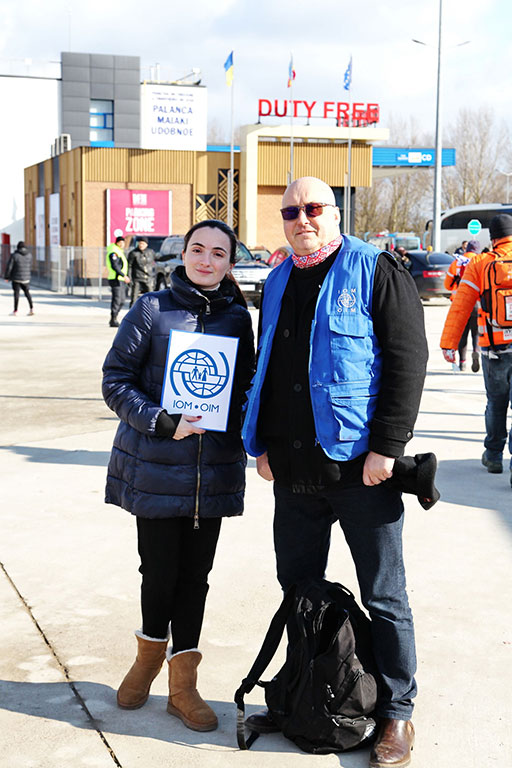
For Lowry and a small staff that traveled to Chișinău from Vienna, the job is to tell the story of not only the refugees through his Twitter account and his blog, but of the staff based in Moldova, who are supervising tasks like the procuring of scanners that can quickly read the documents of people waiting to cross the border.
In some ways, this humanitarian crisis is familiar to Lowry, who has been working in the field since 1993 and has been dispatched after natural disasters to places such as Myanmar and Somalia. At the same time, the magnitude here is much worse, he said.
Working in the media, for instance, he said he’s accustomed to a weeklong window after an emergency where the media lets them tell their story before questions about supply bottlenecks become sharper. But he doesn’t expect that now.
“My sense is that won’t happen this time because this is just unlike anything else. The media can see from where they are that it’s not going to be easy to get humanitarian aid to where it needs to get to because there’s still a war going on,” he said.
When it comes to helping, Lowry said that it’s natural that people might want to donate goods, but the answer, he said, is cash, cash, and more cash.
“We can buy in bulk locally, so we’re supporting the local market. We can get stuff across borders because we have arrangements with the border authorities. We can move things into where they’re needed,” he said.
The Most Difficult Challenge
Larry Hollingworth, the director of the IDHA, said the trainings, which have taken place for 20 years at Fordham, as well as in Africa, Asia, the Far East, and Latin America, are inexorably intertwined with day-to-day operations such as Lowry’s. While every call to action differs by the cause of the crisis, access, climate, geography, the physical and mental state of the population, and resources available, he said war is the most difficult challenge.
“Humanitarian aid workers pride themselves on a response which is neutral, impartial, and independent. We try not to take sides. In many crises, this is very hard, because there is an oppressor and an oppressed. Such is the case in Ukraine today. We have resources, we have the expertise, we have the humanitarian imperative to respond, but we have very limited access,” he said, noting this the war has quickly morphed from a regional crisis to a global one.
“There is so much more we could do if the population had egress. This is a cruel barbaric war that it is a dark stain on the Russian nation. They are deceived by the propaganda and lies of a small group of their leaders.”
Hollingworth suggested that we should prepare for the long haul, as history and experience tell us that the forced migrations of the millions of people from Ukraine will lead to protracted crises, and it may be decades before all who left return.
“We must also never forget that this is but one crisis. Its location has projected it to the front stage,” he said.
“The humanitarian community is facing huge challenges in many other parts of the world where the media coverage and the resource’s response is at best minimal.”
Lowry, meanwhile, is hoping to rejoin his team soon. He will return to Vienna for a break but will likely be back again. His second daughter was born in Kyiv, and he still has friends who live there.
“The thought of Kyiv being reduced to rubble, it’s as heart-wrenching as if it were happening to Dublin,” he said.
The Institute of International Humanitarian Affairs, which was founded in 2001, is a university-wide center that reports directly to Fordham’s Office of the President. It serves as a bridge between academia and humanitarian efforts by hosting training courses, publishing reports on a wide range of humanitarian topics, and hosting events that create an increased understanding of global humanitarian crises.
]]>
But on that day, German leadership agreed to double its defense budget, to 84 billion Euros (roughly $91 billion), and it also authorized a one-time expenditure of 100 billion Euros to modernize its armed forces, signifying that if NATO countries were to get involved in the Russia-Ukraine conflict, Germany would be ready.
In another first, the country also sent weapons to Ukraine and authorized other countries to send German-made weapons there as well.
For Annika Hinze, Ph.D. an associate professor of political science, the director of Fordham’s Urban Studies program, and a native of Germany, the change of heart couldn’t come soon enough.
Q: Were you surprised that Putin decided to invade Ukraine?
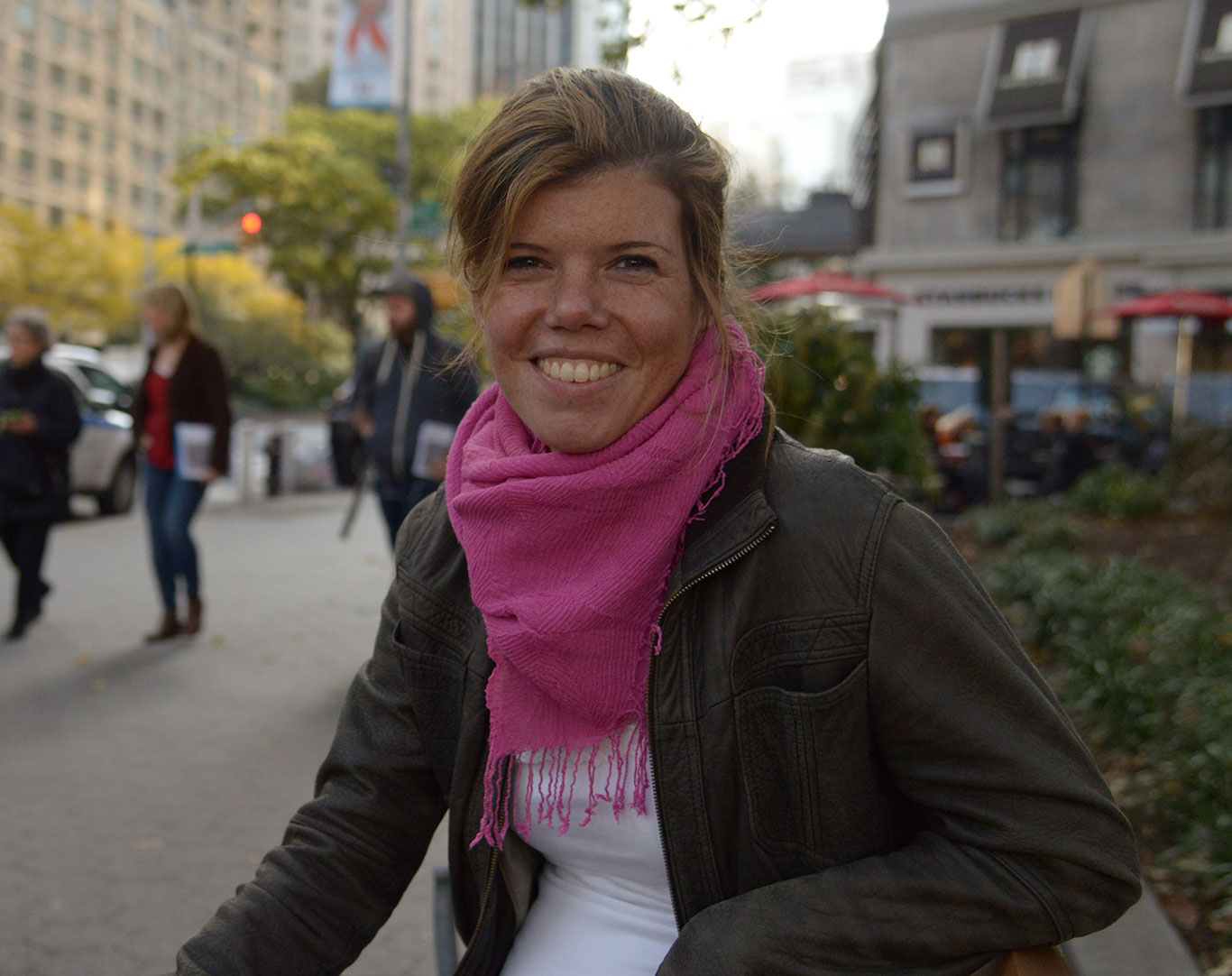
A: No, I don’t think I was. Especially in the last few weeks leading up to it, I think the West was completely asleep and quite frankly, I was really angry. I was angry to see the way that especially German foreign policy was dealing with this. There’s a German phrase Wandel durch Handel, which means “peace through trade.” It’s based on this old but very flawed theory that countries that are engaged in trade relations don’t go to war with each other. But I think all of that is out of the window now.
The German foreign minister said on Thursday, when Putin marched into Ukraine with a full-scale invasion, that she was outraged that Putin had lied to her face and had lied to the face of the German chancellor. Really, are you really surprised? How many times has he lied before?
Q: Do you think Europeans want Germany to get involved?
A: It’s the largest scale conflict on European soil since the end of World War II. All of European policy has tried to work toward preventing any sort of conflict in the European theater again, especially on that scale.
This is different because it’s a full-scale invasion by a former superpower of a sovereign, outspokenly pro-Western democracy. But when we talk about countries like Hungary and Poland, there’s that old ghost of Russia. There are still people alive who remember the Soviets very forcefully overthrowing uprisings for democracy in Eastern bloc countries and, suppressing public opinion and freedom of expression.
As someone from a former aggressor nation, I know my grandma’s stories about World War II. It’s something that’s very vivid still in a lot of Europeans, and especially for Eastern Europeans and Ukrainians, who were invaded by the Nazis, then invaded by the Soviets. And now they’re once again being invaded, by the Russians.
Q: Why do you think Germany has been slow to respond, and what impact does that have on Europe and NATO countries?
A: It’s been very frustrating to see German silence on so many issues. It doesn’t just concern Russia; it’s so many conflicts around the world, or in front of the German doorstep. I think that the European Union should have spoken more forcefully toward violations of human rights and freedom of expression in Hungary, for instance, where we’ve seen a rapid progression towards authoritarianism.
When Donald Trump was inaugurated, [the magazine]Foreign Policy had an article on whether German Chancellor Angela Merkel could replace any American leader as the leader of the free world. It became quite clear that Germany could not fill that position, even though it’s one of the strongest economies in the world. It could not fill that void because the German military is basically defunct right now. They have a lot of work to do before they get back to even a basic defense army.
This was for good reason, of course. The Western allies and the Soviets really didn’t want a strong Germany at the center of Europe again [after World War II], and Germany had to prove its peaceful intentions. But Germans have been too successfully taught not to be aggressors anymore.
Q: How deeply embedded in the German psyche is this importance of not getting involved in war or military conflict?
A: It’s part of our school system. We talk about the Holocaust, we visit concentration camps. There’s been a serious effort to confront in the collective memory what has happened and what Germany did specifically, not just in terms of two wars of aggression, but also in terms of mass genocide at the heart of Europe. That’s allowed a lot of Germans to say, ‘OK, we’re smarter than that now. We’ll never go to war anymore because war is unnecessary and we’re all pacifists.’ But you can’t really be a pacifist without weapons. And that sounds horrible, but I think in today’s world, that is just the truth. If you don’t have any weapons for collective defense, then you can’t keep the peace, especially not against aggressors like Putin.
Q: Do you feel like Putin’s aggression has spurred Germany to take on a leadership role in the world militarily?
A: It’s really too early to say where it will go. But I think the fact that they will then sit on a military that is going to be considerable on a world scale will put them in a position where they’re going to have to make decisions like that. It’s quite amazing that the German Bundestag made its announcement last Sunday, and in response, almost 500,000 people staged a protest against Putin in downtown Berlin. They did it to say we support what has just been decided.
That was really mind-blowing because very suddenly, there’s not just been a turn just in politics, but a turn in public opinion. Suddenly German political leadership has public opinion behind it on this, which has really never had happened since the end of World War II.
]]>For many years, NATO did not admit Ukraine or Georgia to its ranks because its members were afraid that Russia would retaliate by invading Ukraine and other countries, said John Davenport, Ph.D., philosophy professor and director of Fordham’s minor in peace and justice studies. But the effort to placate President Vladimir Putin has gotten us nowhere—except for a war that will result in millions of refugees, hundreds of billions of dollars of damage in Ukraine, and possibly a worldwide recession, he said.
“What we should be doing now is matching him tit for tat … We [should]admit Georgia next year. And as soon as this war is over in Ukraine, we’ll admit Ukraine as well. We’re going to stand up for a no-fly zone. If he takes further aggressive actions, maybe we’ll get rid of the puppet regime that [he’s] supporting in Venezuela. We’re in a new cold war here,” Davenport said. “Putin is doing this partly because he thinks we’re weak-willed, right? That countries in the NATO alliance don’t have the will to fight. If we don’t show him that’s not true, we’re going to end up—by the end of this century—with a world perhaps completely ruled by dictators.”
In the virtual panel on March 4, Davenport and Olena Nikolayenko, Ph.D., a Ukraine native and chair and professor of Fordham’s political science department, explained how Western foreign policy led to the Feb. 24 invasion of Ukraine and offered ways that the U.S. can alleviate the conflict.
A Mission to Revive the Soviet Union
In 1991, the Soviet Union collapsed and Ukraine became an independent state. For Putin, the dissolution of the Soviet Union was the “greatest catastrophe of the 20th century,” said Nikolayenko.
“He’s on a mission to reset Russian greatness and revive the Soviet Union,” said Nikolayenko, who is originally from Ukraine and has held prestigious positions in several U.S. universities. “This year marks the centennial of the establishment of the Soviet Union, which was set up in 1922. So to some extent, maybe it’s not an accident that he decided to launch this military campaign in order to rewrite history.”
Since Putin came to power in 2000, he has successfully seized territory from Russia’s neighbors—Georgia and Ukraine—and supported dictatorships across the world, including the Assad regime in Syria, said the professors. Now he has started “the largest ground war in Europe since World War II,” said Nikolayenko.
Years of Assumptions and Appeasement
There are several factors that emboldened Russia, particularly Western foreign policy, said Nikolayenko. U.S. presidential administrations often downplayed Russia’s belligerent behavior, she said. They expressed concern and implemented soft sanctions to signal disapproval of Russia’s actions, but they continued to maintain diplomatic relations and trade and purchase energy resources from Russia, which inadvertently provided financing for Russia’s military, she said.
“Over the past decade or more, Western governments tried to appease Russia. They assumed that if Russia takes over just one piece of land—a piece of Moldova, a piece of Georgia, a piece of Ukraine—then the incumbent government in Russia can be appeased and the West can continue to have economic, political, and cultural relations with Russia,” Nikolayenko said. “But of course, as we can see now, this policy might not work very well.”
Finding Solutions: Aid, Trade, and a NATO No-Fly Zone
Nikolayenko said that countries can help Ukraine by providing humanitarian assistance for refugees and military aid for the Ukrainian army. She shared several resources with panel attendees, including a list of charity organizations and upcoming anti-war protests worldwide.
She said that countries can also stop trading with Russia, especially in the oil and gas industries, which would significantly undercut Russia’s ability to finance the war. Davenport added that it will be difficult to make Europe independent of Russian energy, but it’s possible within the next decade.
“In the long run, it would take a huge investment—maybe five, 10 years at least,” Davenport said. “We could [massively increase]shipping natural gas … There are other countries that could do the same. This could be the beginning of a big push in Europe to try to become free of Russian energy dependence.”
The U.S. and Western states can also introduce a no-fly zone over Ukraine, which would reduce deaths and overall destruction in Ukraine, said Nikolayenko. However, audience member Annika Hinze, Ph.D., associate professor of political science and director of the urban studies program, pointed out a potential conflict.
“NATO allies are concerned that if they established and policed a no-fly zone over Ukraine, Russia would not respect it and start shooting down NATO fighter jets, putting NATO at a direct confrontation with Russia, and essentially escalating the war into a Great War (and potentially a nuclear conflict),” Hinze typed into a Zoom chat box. “As an expert, do you think these concerns are warranted?”
Nikolayenko said that she didn’t see how, militarily, the Ukrainian army could stop the bombardment of its cities without a no-fly zone.
“The United States and Western states have the military capacity to confront Russia, but they are reluctant to do it,” Nikolayenko said, adding that these countries are worried about further escalating the war. “And this is a source of frustration for many people in Ukraine because the world is watching and not willing to go that far.”
This event was sponsored by Fordham’s Pi Sigma Alpha chapter. Watch a full recording of the lecture below:
]]>